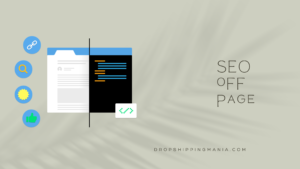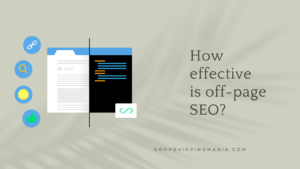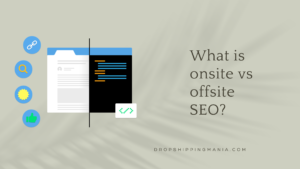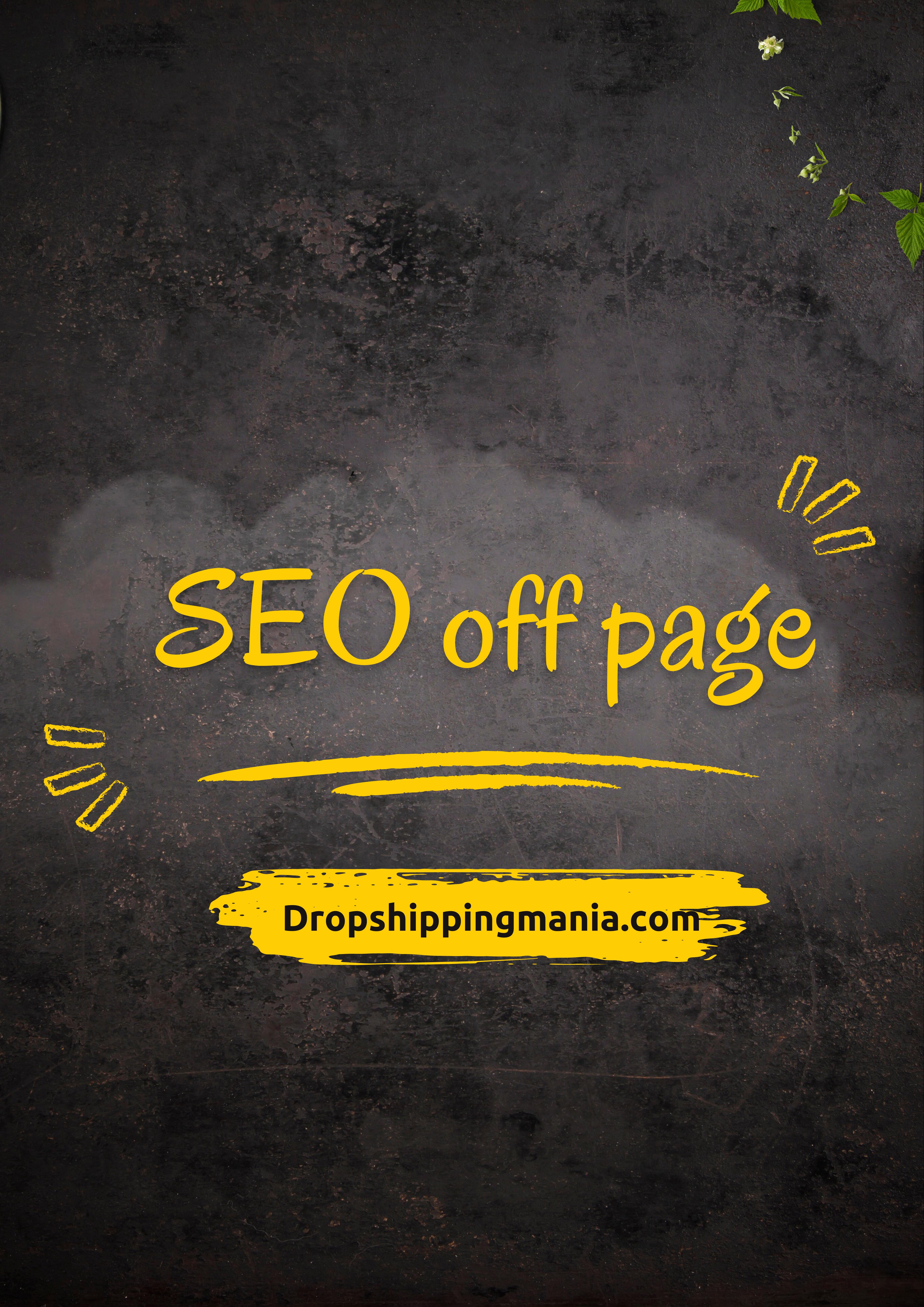SEO off page

If you’re a digital marketer, chances are you have heard of the term “SEO off page.” But do you know what it actually means? SEO off page is a set of techniques that digital marketers use to increase their website’s visibility on search engine results pages (SERPs). By using these tactics, you can gain authority in the eyes of search engines and rank higher in SERPs. This can result in more organic traffic, leads and conversions for your website. In this blog post, we will be exploring the different components of SEO off page and how they help businesses succeed online. So read on to learn more about this important practice and how it can benefit your business.
What is SEO off-page?

SEO off page is the process of optimizing a website for search engine ranking by building links and improving the overall quality of the site. This can be done through directories, social media, and other online marketing channels.
What is off-site SEO examples?

Off-page SEO examples include optimizing your website for backlinks, social media signals, and brand mentions. Backlinks are perhaps the most important factor in off-page SEO. In order for your website to rank higher in search engine results pages (SERPs), you need to have high-quality backlinks from authority websites. Social media signals refer to the engagement that your website or blog post gets on social media platforms like Twitter and Facebook. Brand mentions are when your brand is mentioned on a website or blog, without necessarily having a link to your site. All of these off-page SEO examples can help improve your website’s visibility and organic reach.
Why is off-page SEO important?
Off-page SEO is important because it helps to improve the visibility of a website or blog in search engine results pages (SERPs). It can also help to increase the PageRank of a website. Off-page SEO can be achieved by optimizing the website’s content, structure, and code, as well as by building links from other websites.
How do I run off-page SEO?
Off-page SEO is all about promoting your website or blog off of your own site. This can be done in a number of ways, such as through social media, forum marketing, and blog commenting.
The goal of off-page SEO is to build up your site’s authority and reputation so that it will rank higher in search engine results pages (SERPs). The higher your site ranks, the more traffic you’ll get.
There are a few things you can do to promote your site off-page:
1) Submit your site to directories. This will help your site get indexed by search engines and improve its ranking.
2) Promote your website or blog on social media sites. This will help create backlinks to your site, which will improve its authority.
3) Comment on other blogs in your niche. This will help build relationships with other bloggers and get more exposure for your site.
What are the 4 main techniques of off-page SEO?
There are four main techniques for off-page SEO: link building, social media engagement, brand mentions, and directory listings.
Link building is the process of acquiring links from other websites to your own. This can be done through guest blogging, blog commenting, link exchange programs, or by providing content that other website owners will want to link to.
Social media engagement is the process of interacting with potential and current customers on social media platforms like Twitter, Facebook, and LinkedIn. This can be done by posting updates, answering questions, and joining in on conversations.
Brand mentions are instances where your brand is mentioned online without you necessarily doing anything. These can come in the form of reviews, blog posts, or social media updates.
Directory listings are online directories where businesses can list their basic information like name, address, phone number, and website URL. These are useful for local SEO as they help improve your visibility in search engines for local searches.
Is off-page SEO better than on page SEO?
Off-page SEO is the process of optimizing a website for search engines with the goal of earning higher web traffic levels and improving the visibility of the site. The main focus of off-page SEO is to build links back to the website from other high-quality websites.
There are a number of benefits that come with focusing on off-page SEO. One major benefit is that it can help to improve the search engine rankings of a website. This is because when high-quality websites link back to a site. It tells search engines that the site is trustworthy and relevant. In turn, this can lead to higher rankings in SERPS (search engine results pages).
Another benefit of off-page SEO is that it can help to increase web traffic levels. This is because as a website’s SERP ranking improves, more people are likely to click on the link and visit the site. Furthermore, if a website has a large number of quality inbound links. It can also attract organic traffic from search engines.
Overall, off-page SEO can be extremely beneficial for websites looking to improve their search engine rankings and attract more web traffic. However, it’s important to note that off-page SEO should be just one part of an overall SEO strategy – on page optimization is also important for achieving success in SERPS
How effective is off-page SEO?

Off-page SEO is the process of optimizing a website for Google search with techniques that are outside of the website itself. This includes link building, social media signals, and brand mentions.
Off-page SEO is often considered more difficult than on-page SEO because it requires a higher level of coordination and effort between different parties. However, off-page SEO can be just as effective as on-page SEO in terms of improving Google search visibility.
One study found that the top three ranking factors for Google are backlinks, content, and RankBrain (a machine learning algorithm that processes and evaluates user search queries). Another study found that backlinks and social signals are the most important ranking factors for Bing.
Both studies show that off-page SEO is essential for any website that wants to rank high in Google or Bing search results. Backlinks are especially important, as they are one of the few ranking factors that are directly within a website’s control.
A well-executed off-page SEO strategy can help a website rank higher in search results and get more traffic from organic search.
What is the most important part of off site SEO?
The most important part of off-site SEO is link building. Link building is the process of acquiring links from other websites to your own. The more links you have pointing to your website, the higher your site will rank in search engine results pages (SERPs). Link building can be a difficult and time-consuming task, but it’s essential for anyone serious about getting their website to rank highly in SERPs.
How long is off-page SEO?
Off-page SEO is the process of optimizing a website for search engines with the goal of earning higher search engine rankings. The main focus of off-page SEO is to build links back to your website. The more links you have pointing back to your website. The higher your website will rank in the search engine results pages (SERPs).
The amount of time it takes to see results from off-page SEO can vary greatly. In some cases, you may see results within a few weeks or months. However, in other cases, it may take longer to see any significant results. The important thing is to keep track of your progress and make Adjustments as needed.
Which SEO technique should be avoided?

There are a number of SEO techniques that should avoided in order to ensure that your website is not penalize by Google. These include:
1. Buying links: Google has made it clear that buying links is consider a form of manipulation and will result in a penalty.
2. participating in link schemes: This includes any activity designed to artificially inflate the number of links pointing to a website, such as link farms, excessive link Exchange, and so on. These activities will not only result in a penalty from Google. But can also get your website remove from their search results entirely.
3. Doorway pages: A doorway page is a page design solely for the purpose of ranking well in search engines, and provides little to no value for users. These pages are often full of keyword-stuffed content and very little else. And can result in a penalty from Google if they are detected.
Does deleting pages hurt SEO?
Deleting pages from your website can hurt your SEO in a few ways. First, if you delete a page that has indexed by Google, they will eventually remove it from their search results. This could result in a loss of traffic to your website. Second, if you delete a page with incoming links. Those links will no longer work and could also result in a loss of traffic. Finally, if you change the URL of a page (by deleting it and creating a new one). Any links pointing to the old URL will no longer work and could again result in a loss of traffic.
What is onsite vs offsite SEO?

When it comes to SEO, there are two main types: onsite and offsite. Onsite SEO refers to the optimization of your website itself. While offsite SEO refers to the optimization of your website’s presence on other sites. Both are important for any business with an online presence. But which one you should focus on depends on your goals.
If you’re just starting out with SEO, then onsite optimization is a good place to start. This is because it’s something you have direct control over and it’s relatively easy to implement. Once you’ve nailed down the basics of onsite SEO, you can then move on to offsite SEO. You is generally more complex and time-consuming.
So what exactly is onsite vs offsite SEO? Here’s a quick overview:
Onsite SEO:
– optimizing your website itself for search engines
– includes things like title tags, meta descriptions, images, etc.
– all the factors that you can control directly through your website code and design
Offsite SEO:
– optimizing your website’s presence on other websites
– building links back to your site from high-quality websites
– creating social media profiles and sharing engaging content
– getting press coverage and mentions in popular blogs


